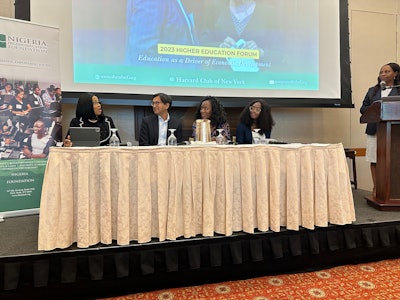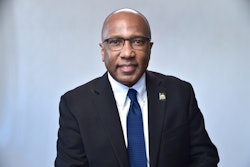There is little doubt that education will prove crucial to the economic development of Nigeria, a country where 63% of residents live with some form of deprivation. However, exactly what needs to be done for the educational system to reach its full potential is far less certain.
On Friday, professors, executives, and non-profit leaders gathered at the Harvard Club of New York for a series of discussions on how education can help Nigeria achieve its economic goals.
The discussions made up the bulk of the 2023 Nigeria Higher Education Forum, a morning-long event put on by the Nigeria Higher Education Forum (NHEF). The NHEF, founded by the John D. and Catherine T. Macarthur Foundation in 2004, focuses on developing the capacity of higher education institutions in the West African nation. The panels revealed clear goals.  Panelists at the 2023 Nigeria Higher Education Forum. Left to right: Dr. Femi Pitan, Kamal Pallan, Titi Odunfa Adeoye, Temilade Adelakun.
Panelists at the 2023 Nigeria Higher Education Forum. Left to right: Dr. Femi Pitan, Kamal Pallan, Titi Odunfa Adeoye, Temilade Adelakun.
Economically developed countries have created a “triple helix” of collaboration between academia, government, and industry, according to panelist Dr. Vincent Idemyor, a professor at the University of Port Harcourt. In Nigeria, those three institutions are siloed, he said, citing the fact that only a few of the nation’s tech hubs have ties to universities. In order for the nation to advance, Idemyor argued, everyone must work together.
Folawe Omikunle, the CEO of Teach for Nigeria, agreed.
“The only way that we’re really going to get to a place where we have well-educated and well-skilled citizens is by working connectively with all stakeholders,” she said.
Omikunle said that the educational system deserves the attention that was paid to it during the COVID-19 pandemic, when the government worked closely with school leadership to make sure that learning continued when in-person classes became impossible. The creative uses of technology that were pioneered during the pandemic could be critical to future development, she argued. However, Omikunle admitted that that sort of committed effort might be hard to muster in a non-emergency situation.





















